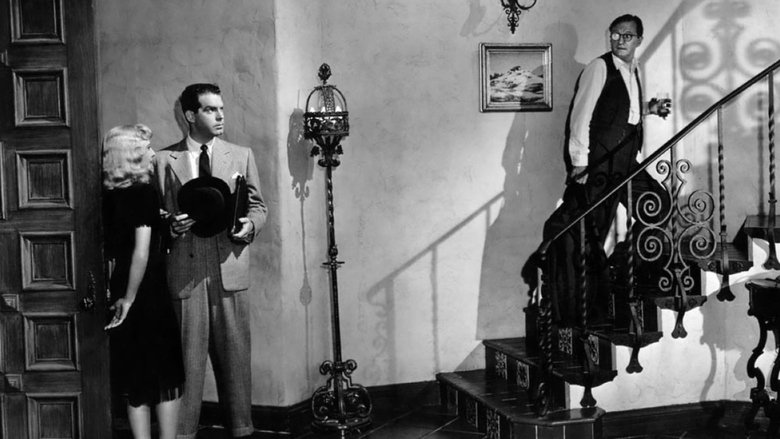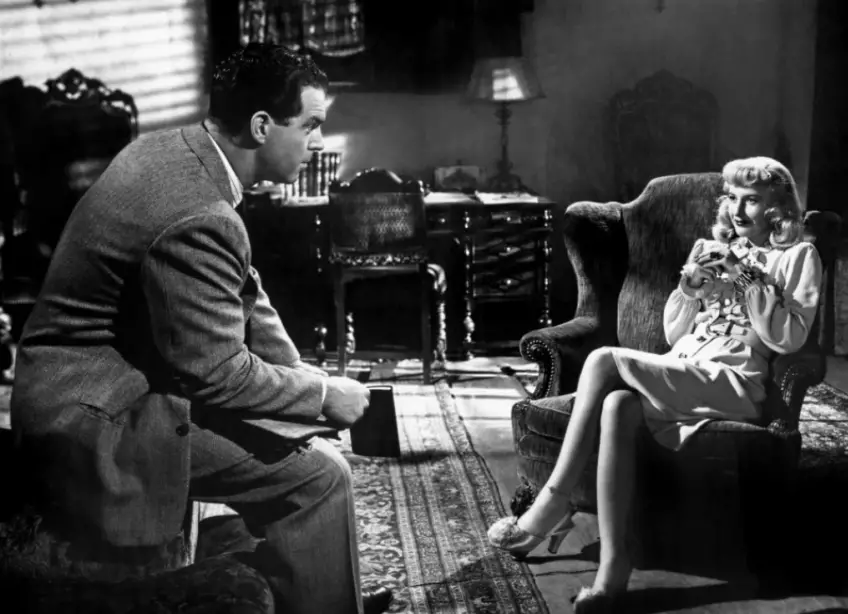← Back to Reviews

in
Double Indemnity
Billy Wilder's skill as a cinematic storyteller is probably the primary reason that 1944's Double Indemnity still brings the sizzle 75 years after its release, though the film turned out to be a lot different than what I expected.

Wilder directed and co-wrote this film noir classic (with Raymond Chandler) about an insurance salesman named Walter Neff (Fred MacMurray) who arrives at the home of one of his clients to talk to him about renewing the policies on his cars, but finds himself instantly attracted to the man's sexpot of a wife, Phyllis (Barbara Stanwyck) and before we know it, Walter and Phyllis are cooking up an elaborate scheme to murder Phyllis' husband and get $100,000 out of a policy they plan to arrange for Phyllis' husband to take out without his knowledge.

I've heard a lot about this film for years and have wanted to see it for a long time, but the premise that I believed set up this film is really not the premise of the film at all. I had always heard that this film was about Phyllis talking Walter into helping her murder her husband, but the story was exactly the opposite. From the second their eyes meet, Walter wants Phyllis and it's his idea to get rid of Phyllis' husband and get paid for it through a policy with a double indemnity clause that kicks in if hubby dies the right way. Knowing this whole plan was Walter's idea put a different but no less interesting spin on this story.

Wilder has the class to start the story at the end, with Neff returning to his office, back to
the camera, limping and clinging to his chest, we know immediately that the guy has been shot but we don't know is that he is getting ready to confess his part in this sordid and ugly mess.

Wilder and Chandler's Oscar-nominated screenplay is surprisingly intricate and detail-oriented. Watching the planning Walter puts into this deed is fascinating leaving nothing to chance, except possibly a couple of wild cards he didn't foresee in the form of Phyllis' stepdaughter and her wiseguy boyfriend. A good deal of the story is told through Walter's confession/narration and Wilder's visualization of same.

MacMurray is surprisingly effective in a Bogey kind of role, but it is Stanwyck, robbed of the Best Actress Oscar for which she was nominated, who really puts the sizzle in this one. A big shout out to Edward G. Robinson as well, in another classy turn as Walter's boss, who methodically, in the style of Columbo, begins to put together the pieces of what happens here. I loved the fact that even after the police investigated what happened, they were thanked by the insurance company for their work, but they weren't necessarily buying it. Nominated for seven Oscars altogether, this effective film noir had me on the edge of my chair.
Billy Wilder's skill as a cinematic storyteller is probably the primary reason that 1944's Double Indemnity still brings the sizzle 75 years after its release, though the film turned out to be a lot different than what I expected.

Wilder directed and co-wrote this film noir classic (with Raymond Chandler) about an insurance salesman named Walter Neff (Fred MacMurray) who arrives at the home of one of his clients to talk to him about renewing the policies on his cars, but finds himself instantly attracted to the man's sexpot of a wife, Phyllis (Barbara Stanwyck) and before we know it, Walter and Phyllis are cooking up an elaborate scheme to murder Phyllis' husband and get $100,000 out of a policy they plan to arrange for Phyllis' husband to take out without his knowledge.

I've heard a lot about this film for years and have wanted to see it for a long time, but the premise that I believed set up this film is really not the premise of the film at all. I had always heard that this film was about Phyllis talking Walter into helping her murder her husband, but the story was exactly the opposite. From the second their eyes meet, Walter wants Phyllis and it's his idea to get rid of Phyllis' husband and get paid for it through a policy with a double indemnity clause that kicks in if hubby dies the right way. Knowing this whole plan was Walter's idea put a different but no less interesting spin on this story.

Wilder has the class to start the story at the end, with Neff returning to his office, back to
the camera, limping and clinging to his chest, we know immediately that the guy has been shot but we don't know is that he is getting ready to confess his part in this sordid and ugly mess.

Wilder and Chandler's Oscar-nominated screenplay is surprisingly intricate and detail-oriented. Watching the planning Walter puts into this deed is fascinating leaving nothing to chance, except possibly a couple of wild cards he didn't foresee in the form of Phyllis' stepdaughter and her wiseguy boyfriend. A good deal of the story is told through Walter's confession/narration and Wilder's visualization of same.

MacMurray is surprisingly effective in a Bogey kind of role, but it is Stanwyck, robbed of the Best Actress Oscar for which she was nominated, who really puts the sizzle in this one. A big shout out to Edward G. Robinson as well, in another classy turn as Walter's boss, who methodically, in the style of Columbo, begins to put together the pieces of what happens here. I loved the fact that even after the police investigated what happened, they were thanked by the insurance company for their work, but they weren't necessarily buying it. Nominated for seven Oscars altogether, this effective film noir had me on the edge of my chair.
